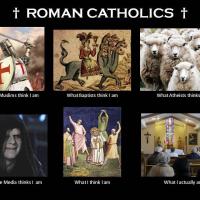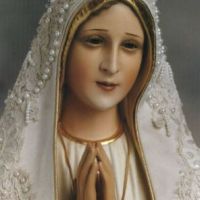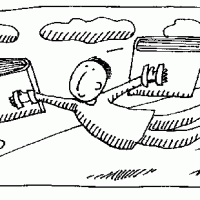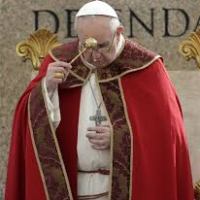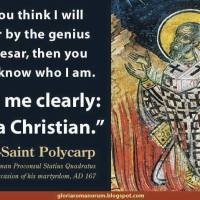All posts for the month March, 2012
He did this…
Posted by 1catholicsalmon on March 30, 2012
https://1catholicsalmon.wordpress.com/2012/03/30/he-did-this/
Humanae Vitae: Day 5
5. The consciousness of the same responsibility induced us to confirm and expand the commission set up by Our predecessor Pope John XXIII, of happy memory, in March, 1963. This commission included married couples as well as many experts in the various fields pertinent to these questions. Its task was to examine views and opinions concerning married life, and especially on the correct regulation of births; and it was also to provide the teaching authority of the Church with such evidence as would enable it to give an apt reply in this matter, which not only the faithful but also the rest of the world were waiting for. (5)
When the evidence of the experts had been received, as well as the opinions and advice of a considerable number of Our brethren in the episcopate—some of whom sent their views spontaneously, while others were requested by Us to do so—We were in a position to weigh with more precision all the aspects of this complex subject. Hence We are deeply grateful to all those concerned.
Paragraph 5 simply speaks of a study commission that was begun by Pope John XXIII that Pope Paul VI has asked to be expanded.
(Posted with permission from Fr. Lee Acervo at http://fatheracervo.wordpress.com)
Posted by 1catholicsalmon on March 30, 2012
https://1catholicsalmon.wordpress.com/2012/03/30/554/
Humanae Vitae: Day 4
This kind of question requires from the teaching authority of the Church a new and deeper reflection on the principles of the moral teaching on marriage—a teaching which is based on the natural law as illuminated and enriched by divine Revelation.
No member of the faithful could possibly deny that the Church is competent in her magisterium to interpret the natural moral law. It is in fact indisputable, as Our predecessors have many times declared, (Popes Pius IX, Pius X, Pius XI, Pius XII, and John XXIII) that Jesus Christ, when He communicated His divine power to Peter and the other Apostles and sent them to teach all nations His commandments (cf. Mt 28:18-19), constituted them as the authentic guardians and interpreters of the whole moral law, not only, that is, of the law of the Gospel but also of the natural law. For the natural law, too, declares the will of God, and its faithful observance is necessary for men’s eternal salvation (cf. Mt 7:21).
In carrying out this mandate, the Church has always issued appropriate documents on the nature of marriage, the correct use of conjugal rights, and the duties of spouses. These documents have been more copious in recent times.
First, let’s define some necessary terms:
- Natural Law: the basic principles of right and wrong that exists in every human person by nature. God created us with these principles in our hearts, and so every human person is capable of knowing these principles. Pope Leo XIII said, “The natural law is engraved in the soul of every man, because human reason tells him to do good and avoid evil. It has force because it is the voice of a higher reason to which our spirit must submit.”
- Moral law: The law given to us by God that says “to do what is good and avoid what is evil” (cf. Gaudium et Spes, n. 16). It is our conscience that urges us to follow this law for it will lead us to Heaven.
Some points to notice:
- The “moral teaching on marriage” is based on natural law. God teaches us through divine Revelation in the words of Scripture and the teachings of His Church, but the basic principles are known to man naturally. This includes things such as marriage being between one man and one woman and procreation as the fruit of marriage. These are common sense things.
- The Church is competent to speak on matters of marriage and family because Jesus Christ Himself gave the Church His authority to teach. And because the moral law relates to our salvation, the Church is “the authentic guardians and interpreters of the whole moral law”.
Here we get to one of the problems of the day. There are many, even among Catholics, who don’t see the Church as the authority when it comes to the moral law but only see that Church as one voice among many. Not to mention that there is also an anti-authoritarian mindset that resides in the modern culture. We’ve been taught to question and even distrust authority. People want to trust Jesus but not necessarily the Church that He founded even though it was Jesus who gave the Church His authority.
And so one thing that we have to do help others to see the Church’s role in salvation. What sets the Church apart from “other voices” is that the Church alone has been given her authority by Jesus Christ. The Church didn’t take it upon herself to teach and interpret moral law. She was ordained and sent out by God to do so.
So why can the Church answer the questions that the world poses regarding the transmission of life? Why can the Church declare and teach what is morally good and morally evil? Because Jesus founded the Church to do just that.
(Posted with permission from Fr. Lee Acervo at http://fatheracervo.wordpress.com)
Posted by 1catholicsalmon on March 29, 2012
https://1catholicsalmon.wordpress.com/2012/03/29/humanae-vitae-day-4/
Humanae Vitae:Day 3
3. This new state of things gives rise to new questions. Granted the conditions of life today and taking into account the relevance of married love to the harmony and mutual fidelity of husband and wife, would it not be right to review the moral norms in force till now, especially when it is felt that these can be observed only with the gravest difficulty, sometimes only by heroic effort?
Moreover, if one were to apply here the so called principle of totality, could it not be accepted that the intention to have a less prolific but more rationally planned family might transform an action which renders natural processes infertile into a licit and provident control of birth? Could it not be admitted, in other words, that procreative finality applies to the totality of married life rather than to each single act?
A further question is whether, because people are more conscious today of their responsibilities, the time has not come when the transmission of life should be regulated by their intelligence and will rather than through the specific rhythms of their own bodies.
Paragraph 3 makes note of some “new questions” that are brought upon the Church’s teaching by the modern world. Those who ask these questions are trying to find good reasons to justify the artificial control of birth, that one cannot judge until the “big picture” is looked at. After all, hasn’t man become sophisticated enough that he can decide how many and when children are to born?
This and the previous paragraphs show that the Church is very much aware of the challenges that husbands and wives face in living their vocations. But the Church also reminds us that the “moral norms” are those that have always been in force and with good reason, that they are observed “only with the gravest difficulty”, and that fidelity takes “heroic effort” on the part of both husband and wife. It is that “heroic effort” that allows one to become a saint.
Posted by 1catholicsalmon on March 28, 2012
https://1catholicsalmon.wordpress.com/2012/03/28/humanae-vitaeday-3/
Notable Quote!
“It seems to me very important to announce a God who responds to our reason. We see the rationality of the cosmos; we see that there is something behind it. But we do not see how this God is near to us, how He concerns Himself with me. We do not see how this synthesis of the great and majestic God with the small God orients me, shows me the values of my life. To show this is the nucleus of evangelization.”
– Pope Benedict XVI, Interview on Flight to Mexico City, March 23, 2012
Posted by 1catholicsalmon on March 27, 2012
https://1catholicsalmon.wordpress.com/2012/03/27/notable-quote/
Humanae Vitae: Day 2
2. The changes that have taken place are of considerable importance and varied in nature. In the first place there is the rapid increase in population which has made many fear that world population is going to grow faster than available resources, with the consequence that many families and developing countries would be faced with greater hardships. This can easily induce public authorities to be tempted to take even harsher measures to avert this danger. There is also the fact that not only working and housing conditions but the greater demands made both in the economic and educational field pose a living situation in which it is frequently difficult these days to provide properly for a large family.
Also noteworthy is a new understanding of the dignity of woman and her place in society, of the value of conjugal love in marriage and the relationship of conjugal acts to this love.
But the most remarkable development of all is to be seen in man’s stupendous progress in the domination and rational organization of the forces of nature to the point that he is endeavoring to extend this control over every aspect of his own life—over his body, over his mind and emotions, over his social life, and even over the laws that regulate the transmission of life.
The way that the world was thinking began to change during this time. Paragraph 2 presents some of those changes because they presented some challenges to the Church’s teaching on the transmission of life: this was a time of fears of overpopulation, the women’s lib movement, and humanity’s increasing drive to control everything through science and technology.
The Church has always taught that the marital act, although it also has a meaning and purpose in the strengthening of the bond between husband and wife, can never be deliberately separated from the possibility of procreation. Yet modern thought protested with many saying the children were a burden or an obstacle to “freedom”. Many tried to explain it away by pointing to so-called social and economic problems and the fear of the difficulties that another child would bring. Lost was the eternal belief that children were to be seen as a gift from God, the author and giver of life.
We read from the Catechism of the Catholic Church, n. 2378:
A child is not something owed to one, but is a gift. The “supreme gift of marriage” is a human person. A child may not be considered a piece of property, an idea to which an alleged “right to a child” would lead. In this area, only the child possesses genuine rights: the right “to be the fruit of the specific act of the conjugal love of his parents,” and “the right to be respected as a person from the moment of his conception.”
Regarding the fear that many people had in the size of the world’s population, the Population Research Institute (a pro-life group) has done a lot to debunk the myth of overpopulation. They did a series of videos a while back (here’s one) but essentially, there are a lot of historical and scientific facts that disprove overpopulation. Let’s not forget the Lord’s command from the very beginning to “be fruitful and multiply, bring forth abundantly on the earth and multiply in it” (Gen 9:7).
(Posted with permission from Fr. Lee Acervo at http://fatheracervo.wordpress.com)
Posted by 1catholicsalmon on March 26, 2012
https://1catholicsalmon.wordpress.com/2012/03/26/humanae-vitae-day-2/
Humanae Vitae in 31 days: Day 1

Image from http://www.mycatholicfaithdelivered.com
The recent mandate from the US Department of Health and Human Services (HHS) in forcing all institutions to include coverage for contraception, sterilization and abortifacients in the healthcare plans they offer, is an attack against religious liberty as it doesn’t allow religious institutions to be exempt from the mandate. Those who are morally opposed to contraception, sterilization and abortifacients – including Catholic hospitals and universities – should not be forced into acting against their consciences.
This mandate has not only escalated the secularists’ war against the Church, it has also revealed some disturbing things about the general Catholic population’s understanding about the evil nature of contraception. A recent survey done by the Pew Research Center on February 14, 2012 showed that only 15% of Catholics say that using contraceptives is morally wrong. 36% say that it’s not a moral issue. Even among Catholics who say that they attend Mass weekly,only 27% say that using contraceptives is morally wrong. Those numbers are stunningly sad and disappointing to me, but it shows that we have A LOT of work to do.
All of this having to do with the HHS mandate is has given us an opportunity to further emphasize the Church’s teaching from the beginning that the use of contraception is an intrinsic evil: “Every action which, whether in anticipation of the conjugal act, or in its accomplishment, or in the development of its natural consequences, proposes, whether as an end or as a means, to render procreation impossible is intrinsically evil” (Catechism of the Catholic Church, n. 2370; Humanae Vitae, n. 14).
We can start by making sure that everyone reads Pope Paul VI’s Encyclical “Humanae Vitae”. It’s a short document (there are thirty-one paragraphs), but it is both an amazing and prophetic document. I also thought that I could post one paragraph a day here for 31 days.
Let’s start with the introduction:
The transmission of human life is a most serious role in which married people collaborate freely and responsibly with God the Creator. It has always been a source of great joy to them, even though it sometimes entails many difficulties and hardships.
The fulfillment of this duty has always posed problems to the conscience of married people, but the recent course of human society and the concomitant changes have provoked new questions. The Church cannot ignore these questions, for they concern matters intimately connected with the life and happiness of human beings.
Paul VI begins by pointing that married couples being able to cooperate in God’s work of procreation is both a “serious role” and “a source of great joy.” However, the pope also recognizes that “the recent course of human society and the concomitant changes have provoked new questions”. Remember that this was written in 1968. It’s amazing to think how those challenges have multiplied and intensified in the last forty-three years.
The Church is not oblivious to what’s going on in the world. In fact, she is the one who is dealing with these challenges head on because “they concern matters intimately connected with the life and happiness of human beings.” This doesn’t only affect individuals. It affects all of humanity.
(Posted with permission from Fr. Lee Acervo at http://fatheracervo.wordpress.com)
Posted by 1catholicsalmon on March 25, 2012
https://1catholicsalmon.wordpress.com/2012/03/25/humanae-vitae-in-31-days-day-1/
Something to think about.
“Our entire daily lives cannot be occupied with purely religious practices;all of us have to eat, and most of us have and want to do many other activities besides. So though we cannot always be religious in this sense, we can always be Catholic, that is, the round of our daily activities can be conducted in such a way as to express and be in harmony with our Faith. And [this] can involve more than avoiding sin and exercising virtue.”
A quote form ‘Catholic Milieu‘ Thomas Storck
Posted by 1catholicsalmon on March 25, 2012
https://1catholicsalmon.wordpress.com/2012/03/25/528/
Why choose to be Catholic?

Image from St. Mary’s Parish
Posted by 1catholicsalmon on March 24, 2012
https://1catholicsalmon.wordpress.com/2012/03/24/aaa450x300_pilot_11965/
tradition, Sacred Tradition, Catholic Tradition.
Catholic Tradition often seems odd to those outside the Catholic Church. People assume it’s something that we just… “made up.” The word “tradition” actually means handing down something to another person. Scripture testifies to this meaning of Catholic Tradition as the normal mode of transmitting the Faith:
“So then, brethren, stand firm and hold to the traditions which you were taught by us, either by word of mouth or by letter.” (2 Thess 2:15)”For I received from the Lord what I also handed on to you….” (1 Cor 11:23)
“For I handed on to you as of first importance what I also received….” (1 Cor 15:3)
“…I know whom I have believed [i.e., Jesus], and I am sure that he is able to guard until that Day what has been entrusted to me. Follow the pattern of the sound words which you have heard from me, in the faith and love which are in Christ Jesus; guard the truth that has been entrusted to you by the Holy Spirit who dwells within us.” (2 Tim 1:11-14)
“You then, my son, be strong in the grace that is in Christ Jesus, and what you have heard from me before many witnesses entrust to faithful men who will be able to teach others also.” (2 Tim 2:1-2)
“…I found it necessary to write appealing to you to contend for the faith which was once for all delivered to the saints.” (Jude 1:3)
This is the most basic meaning of Catholic Tradition: it is the true Faith itself, given to the Apostles by Christ and faithfully transmitted to each new generation. (Catechism, 77-78)
Sacred Tradition comes from Christ. It’s the full, living gift of Christ to the Apostles, faithfully handed down through each generation. It is through Tradition that the Holy Spirit makes the Risen Lord present among us, offering us the very same saving Word and Sacraments that he gave to the Apostles!
Understanding Catholic Tradition is essential to understanding the Catholic Church and the Catholic Christian faith.
Essentially, tradition is a thing handed down from one generation to the next. This is precisely the meaning of the biblical word for tradition: paradosis. Further, we make distinctions between large T and small t traditions even in secular and folk culture. Small t traditions express something of a culture, like a tangerine in your Christmas stocking or singing the happy birthday song at birthday parties. Some small t traditions (like toasting the bride and groom) are very ancient and widely diffused. Some, like Guy Fawkes night, are fairly new and may be confined to only one culture. Some have religious significance, like Advent candles, some are just ingrained customs (like birthday candles). Human culture is immersed in an ocean of such traditions ranging from throwing wedding rice to saluting the flag to celebrating bachelor parties. However, tradition is more than the mere cultural window dressing of small t traditions. It isn’t just little customs. It is also a way of being, thinking and seeing which powerfully (and often unconsciously) influences our lives and even our relationship with God.
There are aspects of Christian life which, the Church teaches, are principally handed on to us, not so much through Scripture as through tradition. Some of this tradition, says the Church, is small t stuff: candles, favourite songs, styles of prayer, popular forms of devotion, beloved books, treasured old rituals like Christmas caroling, foods such as Christmas cake and Christmas Turkey or Easter eggs. Yet, when push comes to shove, if children were not taught these traditions, none of these small t traditions, vital and living though they are, is essential to the Faith.
The Second Vatican Council (“Vatican II”) wrote an important document called “On Divine Revelation” (Dei Verbum in Latin). It’s quite readable, and contains definitive teaching on the full meaning of Catholic Tradition.
The Council notes the importance of seeing that Catholic Tradition is firmly rooted in the Apostles: it is Christ’s whole gift to them, and to us. The Council writes:
In His gracious goodness, God has seen to it that what He had revealed for the salvation of all nations would abide perpetually in its full integrity and be handed on to all generations. Therefore Christ the Lord in whom the full revelation of the supreme God is brought to completion…, commissioned the Apostles to preach to all men that Gospel which is the source of all saving truth and moral teaching, and to impart to them heavenly gifts.
(Dei Verbum, 7)
It is specifically this “commissioning of the Apostles” that is fulfilled in the handing on of Catholic Tradition.
The Apostles dedicated themselves to this mission, and they appointed other faithful men to succeed them and carry on their work. That same passage of Dei Verbum continues:
This commission was faithfully fulfilled by the Apostles who, by their oral preaching, by example, and by observances handed on what they had received from the lips of Christ, from living with Him, and from what He did, or what they had learned through the prompting of the Holy Spirit. The commission was fulfilled, too, by those Apostles and apostolic men who under the inspiration of the same Holy Spirit committed the message of salvation to writing.
(Dei Verbum, 7)
Many Protestants believe that Catholics look to Tradition instead of Scripture. Not at all! Catholic Tradition stands with Scripture in forming the one single deposit of the Faith. For Catholics, Sacred Tradition is not in opposition to Scripture: they compliment and confirm one another. Vatican II’s Dei Verbum speaks of “a close connection and communication between sacred tradition and Sacred Scripture”: “both of them… [flow] from the same divine wellspring.”
It says that “Sacred Scripture is the word of God inasmuch as it is consigned to writing under the inspiration of the divine Spirit, while sacred tradition takes the word of God entrusted by Christ the Lord and the Holy Spirit to the Apostles, and hands it on to their successors in its full purity.” The Church, “led by the light of the Spirit of truth, …may in proclaiming it preserve this word of God faithfully, explain it, and make it more widely known.” (Dei Verbum, 9)
This statement reveals another key aspect of Catholic Tradition: it is linked to the active work of the Holy Spirit.
Posted by 1catholicsalmon on March 23, 2012
https://1catholicsalmon.wordpress.com/2012/03/23/tradition-sacred-tradition-catholic-tradition/
























